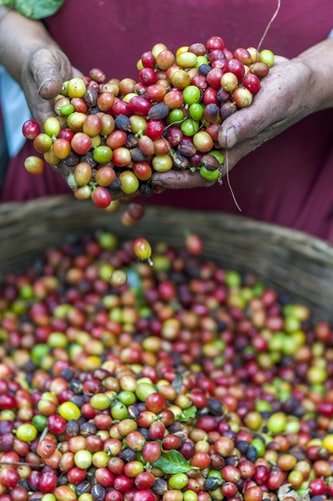Guide to Organic Coffee
When looking for a type of coffee to enjoy, the number of descriptors, labels and logos on the product may seem confusing and overwhelming, especially to someone new to the coffee-drinking world.
When there are so many different types of coffee available, it can be daunting to pick one off the shelf that you hope to enjoy. To help newbies to the coffee world, or those who would like to branch out into sampling different coffee beans, we have been compiling guides to help you work out which beans are best for you. A good starting place is our guide to how different coffee beans from around the world taste!
Aside from taste, you may wish to consider the way in which the coffee is grown, farmed and sold. In this blog post, we take a look at what organic coffee is, how it is grown and whether it is better for you to drink it.

What is Organic Coffee?
When something is described as ‘organic’, it means that it has been grown without the use of chemical fertilisers, pesticides or other additives. As well as coffee, organic farming can be used for a vast range of produce, including fruit, plants and meat.
For coffee to be deemed organic, at least 95% of the coffee beans need to have been grown in organic conditions. For these beans, every stage of their production – from growing to fertilising, harvesting to processing – must be done organically, without the use of chemicals.
If a coffee is organic, it will feature a certified organic logo on its packaging.
Is Organic Coffee Better?
There are many benefits to choosing organic coffee, including:
- Health benefits
- Improved working conditions for farmers
- Better for the environment

Health Benefits
As a consumer, organic coffee has the potential to offer some health benefits over non-organic coffee.
Chemical Free
For a start, the beans will be free from pesticides, herbicides, and other chemicals, which may be harmful to the body. While not everyone is concerned with the consumption of artificial substances in produce, for others, it is a worry, and they may seek out products that are made without.
More Nutrients
Another health benefit of organic coffee is the higher amount of nutrients that can be found in organic beans. Because the soil the coffee plants are grown in is free from chemicals, there are far more nutrients present in the soil, which can be passed on to the beans.
This allows for organic coffee beans to feature more vitamins, minerals and antioxidants, making your brew that little bit healthier.
Better for Farmers
The farmers growing organic produce will also see benefits, as they will not have to work with and breathe in chemicals. Removing the use of harsh chemicals from their daily work will offer health benefits and provide better working conditions.
Better for the Environment
Choosing organic products can also have benefits for the environment, as it helps to reduce the amount of chemicals. When chemicals are used in farming, they can also pollute the water, air and surrounding land, which can have harmful effects on local wildlife, as well as putting people at risk.
Coffee is the second most traded commodity in the world, so by showing a preference for organic methods, you can make a huge impact on the reduction of artificial fertilisers and chemicals used.

Does Organic Coffee Taste Better?
There isn’t a definitive answer here, as the taste of your coffee will depend on a wide variety of factors, including the altitude the beans are grown at, the way the beans are processed and how they are roasted.
However, one argument that can be made for organic coffee tasting better is the amount of quality and care that goes into producing it. Becoming an organic farm isn’t necessarily easy or cheap, as farmers are not able to rely on chemicals which can make the process easier.
Instead, an organic farm will typically operate to higher standards to ensure a successful coffee harvest without pesticides and fertilisers. This, in turn, can mean that the coffee grown organically is of a higher quality, and may, therefore, taste better.
Do you use organic beans in your AeroPress UK coffee maker? Or are you not fussed about whether or not your beans are certified organic? Let us know your thoughts on the matter by leaving a comment below!


0 Comments
There are no comments for this article. Be the first one to leave a message!